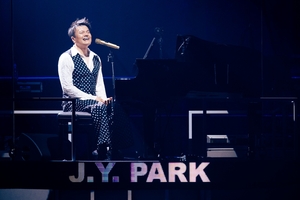
Officials voice hopes for support, but warn against government overreach in private sector
South Korea’s entertainment industry has largely welcomed the appointment of singer-songwriter and JYP Entertainment founder Park Jin-young, also known as J.Y. Park, as co-chair of the newly established Presidential Commission on Pop-Culture Exchange, alongside Culture Minister Chae Hwi-young.
The committee, directly under President Lee Jae Myung, is part of Lee’s pledge to make Korea one of the world’s top five cultural powerhouses. It will serve as a platform for public-private cooperation to expand the global reach of music, film, television and games.
Industry officials say it is too early to predict the committee’s specific impact, given that it is the first of its kind. Still, many expressed optimism that it could energize the cultural sector, provided the government acts as a supporter rather than a driver of private industry initiatives.
Executives in the K-pop industry especially welcomed Park’s appointment, citing his decades of experience as a producer, performer and company leader.
“Park Jin-young has long been at the forefront of discovering and nurturing K-pop artists. Having someone still active in the field take on this role gives us high expectations,” an official from a major K-pop agency told The Korea Herald on Wednesday. “We also hope he can offer meaningful policy suggestions based on his on-the-ground experience.”
At the same time, industry voices warned against excessive state involvement.
“K-pop didn’t grow because of government intervention, but through trial and error in the private sector. If the committee focuses on creating a favorable environment rather than leading with policies, it can be truly beneficial,” the official added.
Another K-pop executive struck a more cautious tone, noting the committee’s direction remains unclear.
“It’s not something to view negatively, but it’s still too early to assess. The fact that the government is showing such interest in popular culture is encouraging, as long as support does not turn into interference,” the executive said.
In the film sector — which has faced mounting challenges in recent years — reactions were similarly positive. One executive at a leading entertainment company said the creation of the presidential committee reflects the government’s recognition of K-content’s growing global influence.
“Having an industry leader rather than an academic figure take on this role could bring practical, content-driven leadership,” the official said. “Inside the industry, people see this as fresh and bold, aligned with the administration’s pragmatic approach.”
A local multiplex official added that budgetary support is already raising hopes.
“Policies such as cinema vouchers act as a catalyst for revitalizing the film industry. We expect this administration’s cultural focus to positively influence the entire sector,” the multiplex official said.
Reactions in the streaming and gaming industries were more reserved. Netflix and Tving, top streaming platforms in Korea, declined to comment. Local game publisher Nexon and Riot Games Korea, the Korean branch of American game company Riot Games, also withheld their positions.
Still, the inclusion of gaming within the committee’s legal framework has sparked speculation that developers, directors and planners could eventually be recognized as “popular culture artists” eligible for institutional support.
Park addressed his new governmental role Tuesday through a social media post. Acknowledging both excitement and apprehension, he promised to “ensure effective institutional support” and increase opportunities for younger artists.
“Taking on a government position is daunting for someone in the entertainment industry, but I believe K-pop now faces a once-in-a-lifetime opportunity that we must seize.”
yoonseo.3348
moonkihoon